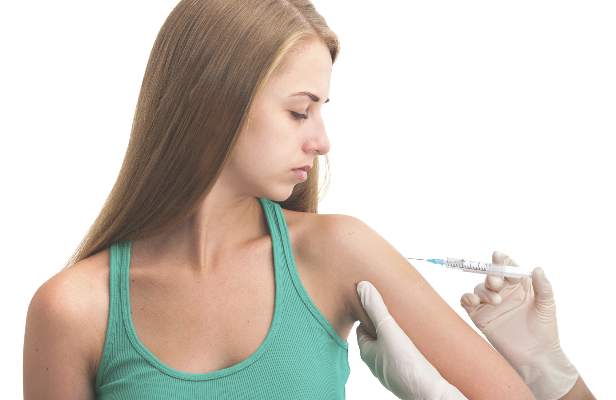User login
Concomitant administration of the meningococcal serogroup B vaccine bivalent rLP2086 with the diphtheria, tetanus, and acellular pertussis and inactivated poliovirus (DTaP/IPV) vaccine produced a immunologically noninferior response in adolescents, compared with administration of DTaP/IPV alone.
Timo Vesikari, MD, PhD, of the University of Tampere (Finland) Medical School and his associates randomized healthy adolescents aged 11-18 years to receive either bivalent rLP2086 plus DTaP/IPV (373 patients) or DTaP/IPV plus saline (376 patients). The researchers achieved the primary objective of the study – demonstrating the noninferiority of rLP2086 with DTaP/IPV. The lower bound of the two-sided 95% confidence interval for the difference in the proportion of responders between the two groups 1 month after the DTaP/IPV dose was greater than –10% for the nine DTaP/IPV antigens. Levels of antibodies to the DTaP/IPV antigens, measured as geometric means, also were similar between the vaccine groups for each antigen, according to the researchers.
There also were substantial immune responses to bivalent rLP2086 plus DTaP/IPV, as measured with serum bactericidal assays using human complement (hSBAs) 1 month after the second vaccination, which increased even more after the third vaccination. The proportions of bivalent rLP2086-plus-DTaP/IPV recipients with prespecified seroprotective hSBA titers to the four meningococcal serogroup B test strains were between 55.5% and 97.3% after vaccination two and between 81.5% and 100% after vaccination three.
“Bivalent rLP2086 was well tolerated and elicited substantial and broad bactericidal responses to diverse [meningococcal serogroup B] strains in a high proportion of recipients after 2 vaccinations, and these responses were further enhanced after 3 vaccinations,” the researchers wrote.
Read the full study in the Journal of the Pediatric Infectious Diseases Society (2016 Jun;5[2]:180-7. doi: 10.1093/jpids/piv064).
Concomitant administration of the meningococcal serogroup B vaccine bivalent rLP2086 with the diphtheria, tetanus, and acellular pertussis and inactivated poliovirus (DTaP/IPV) vaccine produced a immunologically noninferior response in adolescents, compared with administration of DTaP/IPV alone.
Timo Vesikari, MD, PhD, of the University of Tampere (Finland) Medical School and his associates randomized healthy adolescents aged 11-18 years to receive either bivalent rLP2086 plus DTaP/IPV (373 patients) or DTaP/IPV plus saline (376 patients). The researchers achieved the primary objective of the study – demonstrating the noninferiority of rLP2086 with DTaP/IPV. The lower bound of the two-sided 95% confidence interval for the difference in the proportion of responders between the two groups 1 month after the DTaP/IPV dose was greater than –10% for the nine DTaP/IPV antigens. Levels of antibodies to the DTaP/IPV antigens, measured as geometric means, also were similar between the vaccine groups for each antigen, according to the researchers.
There also were substantial immune responses to bivalent rLP2086 plus DTaP/IPV, as measured with serum bactericidal assays using human complement (hSBAs) 1 month after the second vaccination, which increased even more after the third vaccination. The proportions of bivalent rLP2086-plus-DTaP/IPV recipients with prespecified seroprotective hSBA titers to the four meningococcal serogroup B test strains were between 55.5% and 97.3% after vaccination two and between 81.5% and 100% after vaccination three.
“Bivalent rLP2086 was well tolerated and elicited substantial and broad bactericidal responses to diverse [meningococcal serogroup B] strains in a high proportion of recipients after 2 vaccinations, and these responses were further enhanced after 3 vaccinations,” the researchers wrote.
Read the full study in the Journal of the Pediatric Infectious Diseases Society (2016 Jun;5[2]:180-7. doi: 10.1093/jpids/piv064).
Concomitant administration of the meningococcal serogroup B vaccine bivalent rLP2086 with the diphtheria, tetanus, and acellular pertussis and inactivated poliovirus (DTaP/IPV) vaccine produced a immunologically noninferior response in adolescents, compared with administration of DTaP/IPV alone.
Timo Vesikari, MD, PhD, of the University of Tampere (Finland) Medical School and his associates randomized healthy adolescents aged 11-18 years to receive either bivalent rLP2086 plus DTaP/IPV (373 patients) or DTaP/IPV plus saline (376 patients). The researchers achieved the primary objective of the study – demonstrating the noninferiority of rLP2086 with DTaP/IPV. The lower bound of the two-sided 95% confidence interval for the difference in the proportion of responders between the two groups 1 month after the DTaP/IPV dose was greater than –10% for the nine DTaP/IPV antigens. Levels of antibodies to the DTaP/IPV antigens, measured as geometric means, also were similar between the vaccine groups for each antigen, according to the researchers.
There also were substantial immune responses to bivalent rLP2086 plus DTaP/IPV, as measured with serum bactericidal assays using human complement (hSBAs) 1 month after the second vaccination, which increased even more after the third vaccination. The proportions of bivalent rLP2086-plus-DTaP/IPV recipients with prespecified seroprotective hSBA titers to the four meningococcal serogroup B test strains were between 55.5% and 97.3% after vaccination two and between 81.5% and 100% after vaccination three.
“Bivalent rLP2086 was well tolerated and elicited substantial and broad bactericidal responses to diverse [meningococcal serogroup B] strains in a high proportion of recipients after 2 vaccinations, and these responses were further enhanced after 3 vaccinations,” the researchers wrote.
Read the full study in the Journal of the Pediatric Infectious Diseases Society (2016 Jun;5[2]:180-7. doi: 10.1093/jpids/piv064).
FROM THE JOURNAL OF THE PEDIATRIC INFECTIOUS DISEASES SOCIETY

